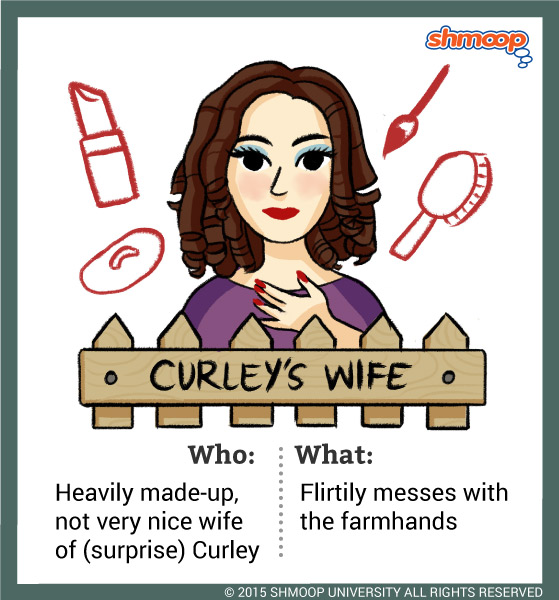Character Analysis

(Click the character infographic to download.)
Curley's wife has a lot of names, but we can't repeat any of them in mixed company. Let's just call her trouble: she's a good-looking woman who knows it, wearing makeup, form-fitting dresses, and ostrich-feathered high heels. (Which—let's just say it—maybe a tad impractical for a ranch?) She's basically like the Pioneer Woman, only less tech-savvy.
Poor Little Not-So-Rich Girl
But we're tender-hearted here at Shmoop headquarters, and we can't help feeling a wee bit bad for this poor girl. As the only woman on the ranch, her life is lonely, and Curley isn't much company: he'd rather talk about himself than anything else. Not that she's out to make friends, or anything. When she wanders across some of the men, she says "what am I doin'? Standin' here talkin' to a bunch of bindle stiffs—a n***** an' a dum-dum and a lousy ol' sheep—an' likin' it because they ain't nobody else" (4.103).
Way to make friends and influence people, Curley's wife.
She also talks a lot (well, twice) about how she could "of went with shows. Not jus' one, either. An' a guy tol' me he could put me in pitchers" (4.102). or at least peddles, because it doesn't seem like anyone is buying) sex.
When she dies, we get a look at the girl she might have been:
the meanness and the plannings and the discontent and the ache for attention were all gone from her face. She was very pretty and simple, and her face was sweet and young. Now her rouged cheeks and her reddened lips made her seem alive and sleeping very lightly. (5)
Can we blame Curley's wife for her pettiness, cruelty, and self-obsession? Or is she, like the ranchhands, just a victim of her circumstances?
Looking's Free
It's probably a combination of both. She flirts deliberately with the ranch hands, to make sure they suffer Curley's hot-headed, glove-wearing wrath and to make Curley feel even worse about himself—two for the price of once.
She also knows how to use her tongue. When she barges in on Lennie, Crooks, and Candy in Chapter Four, she scornfully notes that they "left all the weak ones here" (4.92). Just like Curley, she seeks out people who are smaller and weaker to make herself feel better. She cruelly cuts down Candy for his old age and meekness, Lennie for being "a dum dum," and—oh, yeah—she tells Crooks, "I could get you strung up on a tree so easy it ain't even funny" (4.120).
Basically, Curley's wife is just self-obsessed, and unable to judge herself and her position honestly. At every opportunity, she talks about her lost opportunities. She speaks of a traveling actor who told her she could join their show, without gathering that this is a pretty standard pick-up line. Same with the offer to go to Hollywood: Curley's wife convinces herself that her mother stole the letter, rather than realize that the guys weren't interested in her talent.
Curley's wife's obsession with herself ultimately leads to her death. She's half-afraid of Lennie, but she also wants his attention and praise. It's not a coincidence that that she ends up dying because she didn't want Lennie to mess up her hair: look, and even touch if you want—but don't get too comfortable. She's a tease, leading guys on to make herself feel better. And she gets what she deserves (by the logic of the book): death.
Well, no one ever accused Steinbeck of being a feminist.
Curley's Wife's Timeline